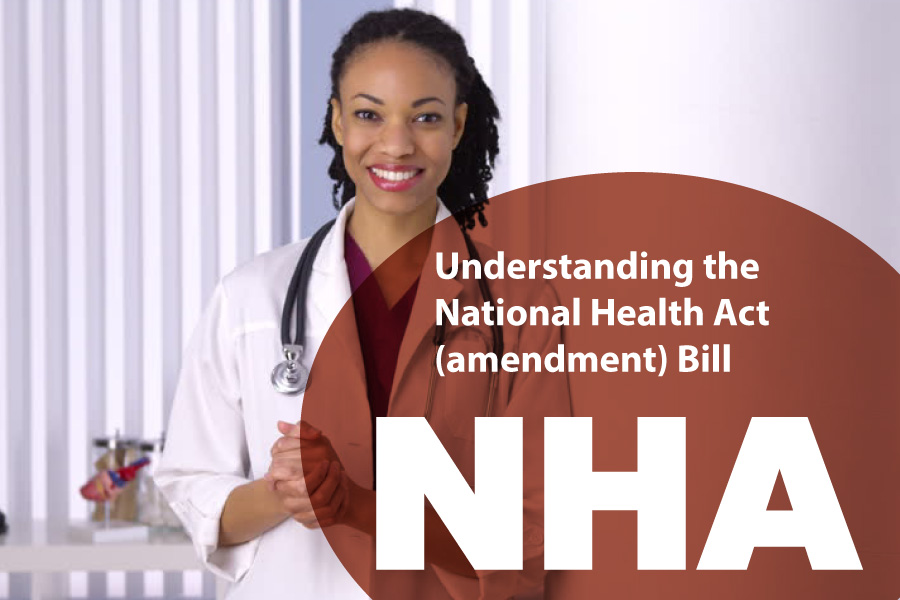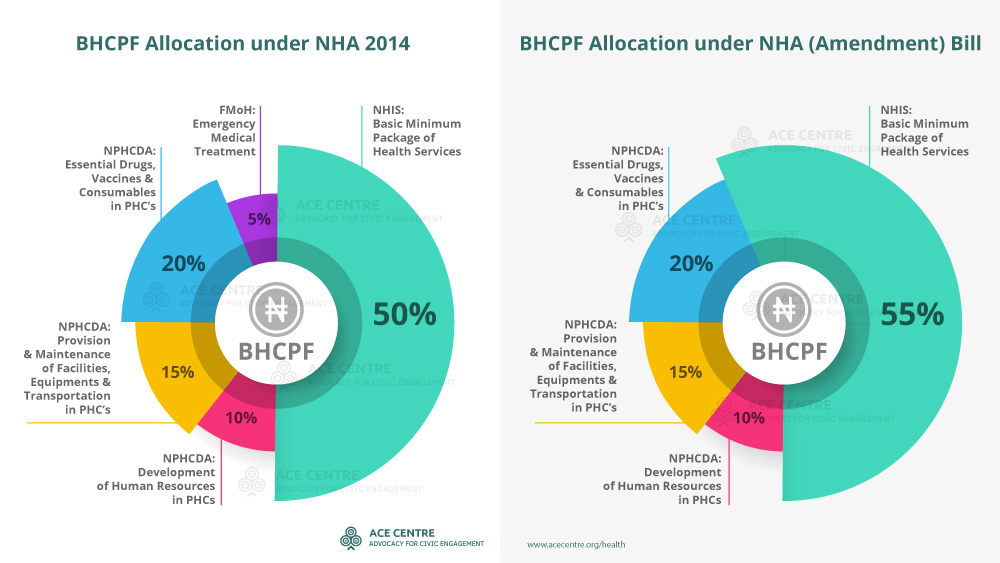
Introduction
The National Health Act 2014 (NHA 2014) was signed into law on the 9th of December 2014 with an aim to provide a framework for the amelioration of Nigeria’s Health System. The benefits of the Act from the year 2014 till date have been far reaching as the Act has provided for the establishment of a National Health System addressing the roles and responsibility of different players in the Nigerian health sector, the Basic Health Care Provision Fund (BHCPF), the provision of health insurance to vulnerable people and the increase in funding for healthcare, which are just a few of the advantages of the Act all set towards the achievement of Universal Health Coverage and to meet the Millennium Development Goals (MDGS). Over the years, Nigeria’s health care professionals have called for the amendment of the NHA 2014 because, although it has universal healthcare delivery in mind, it has been unable to reach its full implementation due to the lack of clarity in some of its key provisions.
The National Health Act (NHA) Amendment Bill 2019 (HB. 668) sponsored by Hon. Mohammed Shamsudeen Bello aims to amend certain provisions of the Act to include definitions where required and to introduce more mechanisms to aid in the realization of the objectives of the principal Act which is to provide free healthcare services to all Nigerians.
Free Healthcare for All
The bill lays the legal framework for the provision of free healthcare for all Nigerians by proposing a replacement of Section 3(1) of NHA with a new provision that empowers the Minister of Health to, in consultation with the National Council on Health (NCH), prescribe conditions where every Nigerian would be entitled to free healthcare services.
The new provision eliminates the previous restriction of free health care to certain categories of persons for services rendered only in public health establishments. This means that all Nigerians may soon be eligible to access free healthcare at any hospital.
Basic Minimum Package of Health Services
Section 3(3) of the extant NHA provides in part that, “…all Nigerians shall be entitled to basic minimum package of health services”. However, it did not define what constitutes basic minimum package thus leaving important provisions of the Act without force and open to various interpretations as to what the package is. The bill proposes an additional subsection (4) in attempt to resolve this ambiguity.
Under the new subsection, the Minister shall hold public hearings in consultation with stakeholders to determine what constitutes the basic minimum package of health services.
By making stakeholder consultation compulsory in determining basic minimum package of health services, the new provision creates room for the amendment of the basic minimum packages based on the changing economic realities, disease burdens and technologies in Nigeria.
BHCPF: Increases NHIS Allocation and Scraps Emergency Medical Treatment Allocation
The bill also affects the application of the Basic Health Care Provision Fund (BHCPF). It proposes a replacement of Section 11(3)(e) of the NHA with a new provision which transfers the 5% allocation of BHCPF meant for emergency medical treatment to the National Health Insurance Scheme (NHIS). This means that NHIS would get a total of 55% of BHCPF while allocations to emergency medical treatment (currently administered by Federal Ministry of Health) would be completely scrapped.

Allocation of Basic Healthcare Provision Funds under the NHA amendment bill
It may be argued that the increased allocation to NHIS is to offset the cost implications of providing free health care to all Nigerians under the proposed amendment of Section 3(1) or to the vulnerable group who are not able to afford basic healthcare under the NHIS and is therefore another huge step towards achieving universal health care in Nigeria.
N/B: There have been several complaints that the emergency medical treatment allocation which was specifically meant for the reimbursement of healthcare providers who offered emergency medical treatment to clients/patients was being misapplied to promote procurements of ambulances which, ordinarily, ought to be budgeted for by the Federal Ministry of Health and its relevant agencies and is also already provided for under the 15% of BHCPF allocated for Provision and Maintenance of Facilities, Equipment and Transportation in PHCs by Section 11(3)(c) of NHA.
NFIU to supervise HMOs
The bill proposes an additional paragraph (f) to Section 11(3) of NHA. The new paragraph (f) seeks to ensure transparency and accountability in the utilization of all such funds allocated to Health Maintenance Organizations (HMOs) by charging the Nigerian Financial Intelligence Unit (NFIU) with the responsibility of supervising such utilization. This is a likely response to the several allegations of widespread corrupt practices by HMOs.
Additional Obligations for Private Healthcare Providers
In the bid to create a more comprehensive National Health Management Information System (NHMIS), the bill seeks to amend Section 38 of the NHA by inserting new paragraphs (b) and (c) which creates the following additional responsibilities for private healthcare providers:
- the provision of a well-articulated affordable healthcare cost and mechanism for monitoring of the prices of services; and
- the provision of framework that regulates healthcare cost and practice by healthcare providers who are of public-private partnership as well as streamlining remuneration of resident and non-resident health care providers.
This provision may be viewed as a step by the government to monitor and perhaps regulate the prices of healthcare services by private and public-private partnership (PPP) healthcare providers. It is also targeted at streamlining the remuneration of resident and non-resident healthcare providers under PPP establishments.
Conclusion
The Amendment Bill will give teeth to certain provisions of the NHA 2014 as it will allow for the effective operationalization and implementation of beneficial provisions of the Act. Although there are further provisions of the Act which may require amendment, this is a welcomed step with an aim towards strengthening Nigeria’s healthcare system.
Attention
The health sector commission of ACE Centre will be presenting a memo at the public hearing of the NHA 2014 amendment bill and has designed an NHA Amendment Bill Review Portal for stakeholders who have reviewed the legislation to send in their contributions and recommendations.
Contributions can also be emailed to health@acecentre.org
